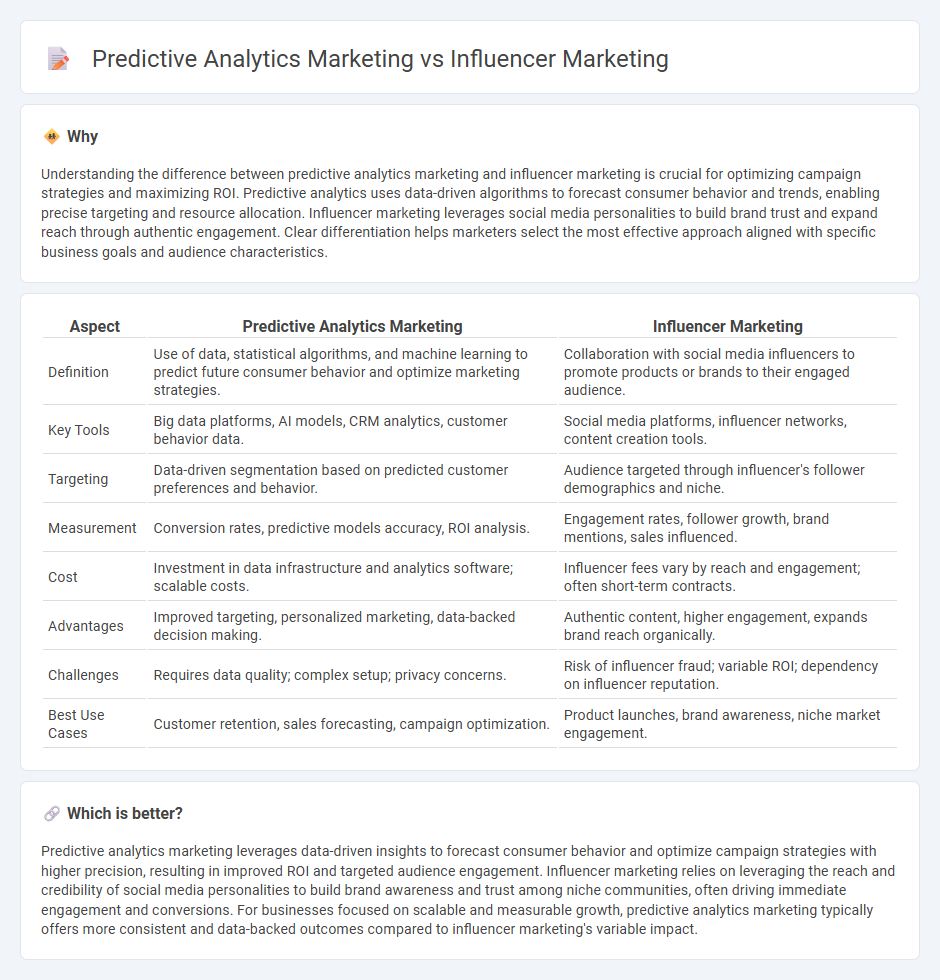
Predictive analytics marketing leverages data, machine learning, and statistical algorithms to forecast consumer behavior and optimize campaign performance, driving higher ROI through informed decision-making. Influencer marketing focuses on partnering with individuals who have established credibility and a strong social media following to authentically promote products and increase brand awareness. Discover how these distinct strategies can transform your marketing approach and boost engagement.
Why it is important
Understanding the difference between predictive analytics marketing and influencer marketing is crucial for optimizing campaign strategies and maximizing ROI. Predictive analytics uses data-driven algorithms to forecast consumer behavior and trends, enabling precise targeting and resource allocation. Influencer marketing leverages social media personalities to build brand trust and expand reach through authentic engagement. Clear differentiation helps marketers select the most effective approach aligned with specific business goals and audience characteristics.
Comparison Table
| Aspect | Predictive Analytics Marketing | Influencer Marketing |
|---|---|---|
| Definition | Use of data, statistical algorithms, and machine learning to predict future consumer behavior and optimize marketing strategies. | Collaboration with social media influencers to promote products or brands to their engaged audience. |
| Key Tools | Big data platforms, AI models, CRM analytics, customer behavior data. | Social media platforms, influencer networks, content creation tools. |
| Targeting | Data-driven segmentation based on predicted customer preferences and behavior. | Audience targeted through influencer's follower demographics and niche. |
| Measurement | Conversion rates, predictive models accuracy, ROI analysis. | Engagement rates, follower growth, brand mentions, sales influenced. |
| Cost | Investment in data infrastructure and analytics software; scalable costs. | Influencer fees vary by reach and engagement; often short-term contracts. |
| Advantages | Improved targeting, personalized marketing, data-backed decision making. | Authentic content, higher engagement, expands brand reach organically. |
| Challenges | Requires data quality; complex setup; privacy concerns. | Risk of influencer fraud; variable ROI; dependency on influencer reputation. |
| Best Use Cases | Customer retention, sales forecasting, campaign optimization. | Product launches, brand awareness, niche market engagement. |
Which is better?
Predictive analytics marketing leverages data-driven insights to forecast consumer behavior and optimize campaign strategies with higher precision, resulting in improved ROI and targeted audience engagement. Influencer marketing relies on leveraging the reach and credibility of social media personalities to build brand awareness and trust among niche communities, often driving immediate engagement and conversions. For businesses focused on scalable and measurable growth, predictive analytics marketing typically offers more consistent and data-backed outcomes compared to influencer marketing's variable impact.
Connection
Predictive analytics in marketing leverages data models to forecast customer behavior and campaign outcomes, enabling brands to identify high-impact influencer partnerships. Influencer marketing benefits from these insights by targeting audiences with precision, optimizing content strategies, and enhancing ROI through data-driven decisions. Integrating predictive analytics refines influencer selection and campaign timing, resulting in more effective and measurable marketing efforts.
Key Terms
**Influencer Marketing:**
Influencer marketing leverages social media personalities with strong follower engagement to promote products, increasing brand trust and awareness through authentic content. It effectively targets niche audiences by utilizing influencer credibility and relatability to drive higher conversion rates. Discover how influencer marketing can elevate your brand presence and maximize ROI in today's digital landscape.
Brand Ambassador
Influencer marketing leverages brand ambassadors to create authentic content that drives consumer engagement and trust, capitalizing on their established audience and personal influence. Predictive analytics marketing uses data-driven models to identify potential brand ambassadors by analyzing past performance metrics, audience demographics, and engagement patterns, optimizing campaign ROI. Explore how combining these approaches can amplify your brand ambassador strategy for greater impact.
Social Engagement
Influencer marketing leverages social engagement by utilizing influencers' authentic connections and audience trust to drive brand interaction and content sharing. Predictive analytics marketing enhances social engagement by analyzing user data patterns to target the right audience with personalized content that maximizes interaction rates. Explore these strategies in-depth to discover how combining both can amplify your social media success.
Source and External Links
Influencer marketing - Wikipedia - Influencer marketing is a form of social media marketing involving endorsements and product placements by individuals or groups recognized as experts or authorities in their field, aiming to influence the purchasing decisions of their followers.
What Is Influencer Marketing? - Mailchimp - Influencer marketing enables businesses to collaborate with individuals who have dedicated social followings to increase brand exposure and reach specific target audiences with authentic, relatable content.
What Is Influencer Marketing: A Strategy Guide for 2025 - Sprout Social - Influencer marketing leverages the trust and authority of social media personalities within their niche, using their recommendations as social proof to influence potential customers and enhance brand credibility.
 dowidth.com
dowidth.com